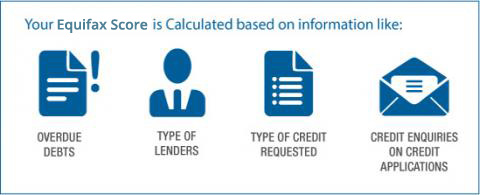
How is my Equifax Credit Score calculated?
15 February 2017
Credit Score, Credit Report, Credit ApplicationA good Equifax Credit Score can help give you confidence to help negotiate a better deal from a lender. If you're applying for credit, or are planning to in the future, it's important to understand your Equifax Credit Score. It is part of the informaiton some credit providers may look at when you apply for credit either with a phone or utility company or a loan with a bank or finance company as part of a credit check.

Your Equifax Credit Score is calculated based on the information held in your credit report at a given point in time. It is a number between 0-1200 and in simple terms, the higher your Equifax Credit Score, the better your credit profile as it indicates a lower risk. The Equifax Credit Score is based on the Equifax Credit Score Model. The scores are proprietary and based on Equifax generated and owned algorithms.
There are a number of key contributing factors that are taken into consideration when generating your Equifax Score:
Type of credit provider
The type of credit provider making an enquiry on your credit report may impact your Equifax Credit Score. E.g. there may be different levels of risk associated with approaching a bank, store finance provider, hire-purchase and utility company for credit.
What’s more, research shows that there’s a different level of risk associated with lenders in particular industries. E.g. a non-traditional lender may have a different level of risk than a bank or credit union.
The type and size of credit requested in your application
Both the type of credit and size of the loan or credit limit you have applied for in the past can have an impact on your Equifax Credit Score. E.g. mortgages, credit cards, personal loans and store finance may carry different levels of risk.
Number of credit enquiries and shopping patterns
Every time you apply for credit and a credit provider obtains a copy of your report, an enquiry is added to your credit report. This can include any loan, mortgage or utilities applications you may make.
Shopping around for credit and applying to a number of different credit providers within a short space of time may negatively impact your Equifax Credit Score. It flags you as a greater risk than infrequent applications for credit with a few credit providers.
Directorship and proprietorship information
Directorship and proprietorship information on a credit report may impact your Equifax Credit Score. If you’re a director or a proprietor it’s important to check the individual and commercial sections of your credit report.
Age of credit report
The date your credit report was created may impact your Equifax Credit Score. E.g. a relatively new file may indicate a different level of risk than an older report.
Pattern of credit enquiries over time
The spread of activity over the credit report’s life to date can have an impact on your Equifax Credit Score. E.g. a relatively new credit file with many enquiries may represent a different level of risk than an older file with only a few credit enquiries.
Personal details
Your Equifax Credit Score takes into consideration personal details such as age, length of employment and length of time at your current residential address to assess risk.
Default information
Default information in your personal or business credit report such as overdue debts, serious credit infringements or clearouts may negatively impact your Equifax Credit Score, while a lack of default information in your file may positively affect your score.\
Court writs and default judgements
A court writ or default judgement on a credit report is an indicator of increased risk and may negatively impact your Equifax Credit Score. Conversely, a lack of court writ or default judgement information would indicate a reduced level of risk.
Commercial address information
Information such as location and the length of time you have resided at your current business address is a measure of stability and may impact your Equifax Credit Score.
If you’re curious about what your Equifax Credit Score is and how you compare to others, you may want to consider signing up to a monthly subscription package.
Your Equifax Credit Score is dynamic and changes depending on when the score is generated and in what circumstances it is requested. Your Equifax Credit Score shows where you sit in relation to other credit-active Australians in our credit-reporting database. This may be used by some lenders as part of the credit assessment process; however, lenders will also use their own lending criteria and policies when assessing your application not only your Equifax Credit Score.
If you would like to get a copy of your free credit report you can order it here.
